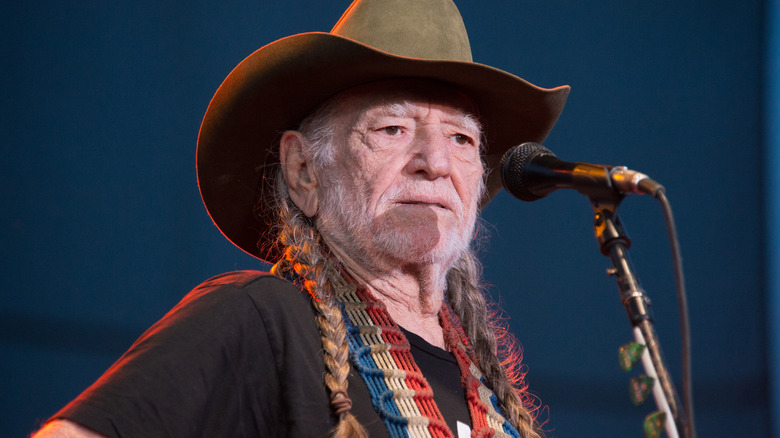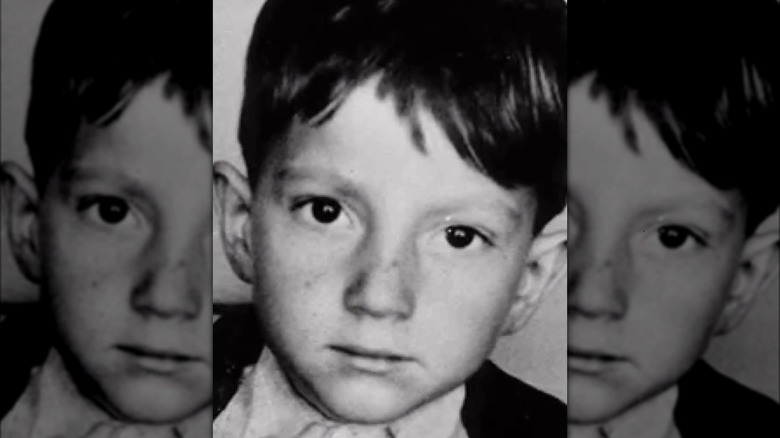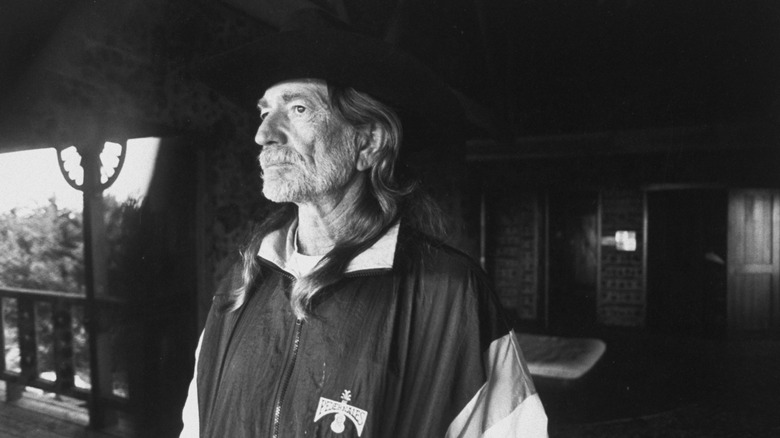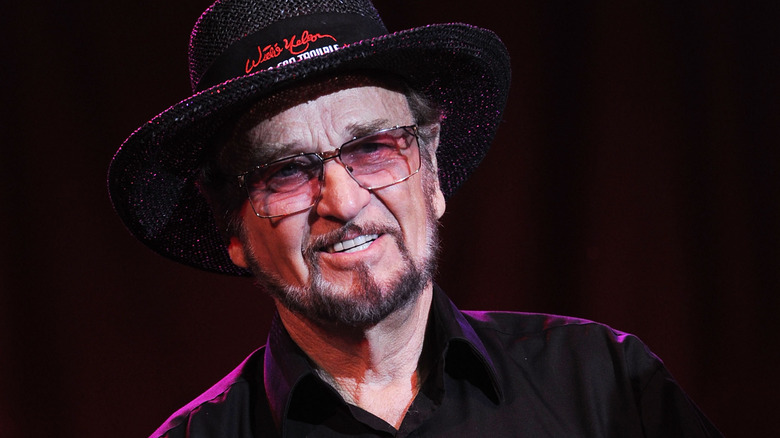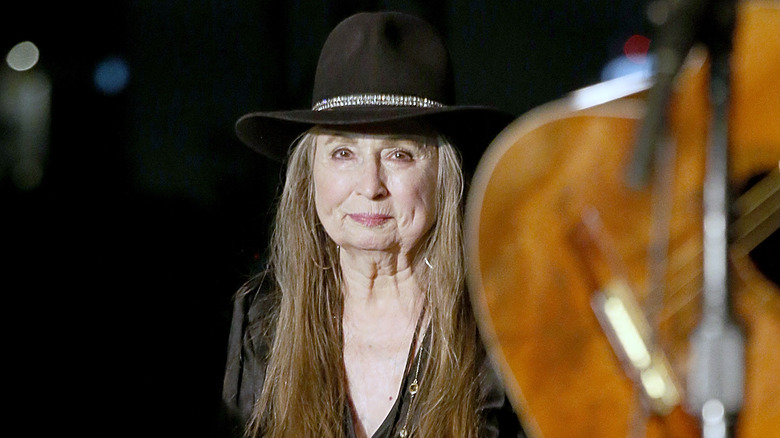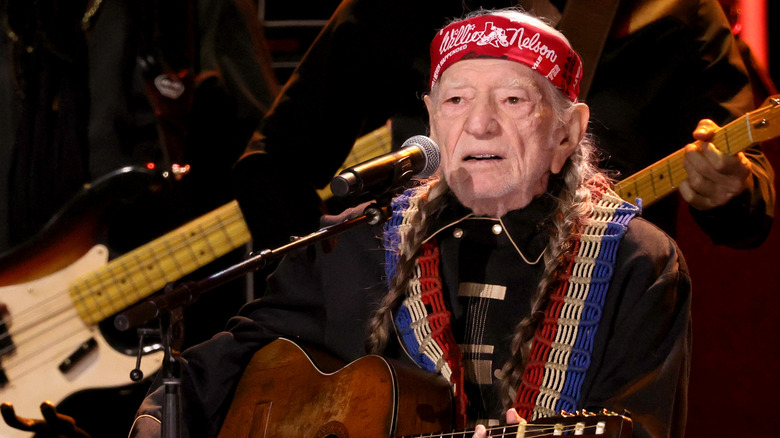The Tragic Truth About Willie Nelson
Note: This article includes references to suicide.
Willie Nelson has put a lot of blacktop behind him since recording "On the Road Again." While the jaunty 1980 hit is one of his most well-known songs, he might argue that his tearjerker tunes have done an even better job of keeping him performing on the road. The Red Headed Stranger has more than a few songs with titles hinting that he's experienced his fair share of heartbreak — early examples are "The Part Where I Cry" and "Man With the Blues."
For Nelson, mining heartache and tragedy for musical inspiration is just a smart business move. In his book "Energy Follows Thought: The Stories Behind My Songs," he reminisces about the time he told fellow country music icon Merle Haggard that "there's good money in sadness" (via Fox News). This was in response to Haggard sharing his opinion of Nelson's 1967 song "The Party's Over," which is about losing a lover by breaking her heart one too many times. "That's the saddest party song ever written," Nelson recalls his late friend saying.
In a 2015 episode of the Rolling Stone docuseries "Mastering the Craft," Nelson talks about a tragedy of the non-romantic variety: having to rescue his trusty guitar Trigger — and a bag of wacky-tobaccy — when his Nashville home burned down in 1969. And that's just the tip of the ten-gallon hat when it comes to the tragedies he's experienced.
His childhood was tough
Willie Nelson's parents got divorced when he was just a baby. They then left him and his older sister Bobbie Nelson in the care of the siblings' grandmother and grandfather, who raised them in the tiny town of Abbott, Texas. Of being abandoned by his mother and father, Willie told Interview magazine, "Neither one of them had a way to take care of us. Really they did us a favor."
Willie used to help his grandfather with his blacksmith business, but the family lost that source of income when Willie was six years old. In "Willie: An Autobiography," the singer compares his grandfather's tragic death from pneumonia to growing up without his parents. "Our separation from Mother and Daddy seemed worse than a death because they were still out there in the world but they weren't with me and Bobbie like they were supposed to be," he writes. According to Willie, the loss also inspired him to start penning songs about heartache as a young child.
Willie helped improve his family's financial situation by picking cotton after school. Temperatures could reach the triple digits, so it's easy to see why Willie began dreaming of getting paid to play music. "Here I was picking cotton in the heat and thinking, There's a better way to make a dollar, and a living," he writes in his book "Roll Me Up and Smoke Me When I Die" (via Today). Luckily, his grandfather had bought him a guitar.
Willie Nelson's suicide attempt
In his book "Me and Paul: Untold Stories of a Fabled Friendship," Willie Nelson reflects on his early days in Nashville, where the future outlaw country innovator felt like an outsider. While struggling to find a foothold as a singer-songwriter, he lived in a ramshackle trailer next to a cemetery. Music gigs were so scarce that he had to start selling encyclopedias to make ends meet. "I'm not one to easily fall prey to depression, but depression had me in its grips," he writes.
Nelson sought solace in the bottle, but his drinking hole of choice forced him to regularly encounter other musicians who were enjoying the success that was eluding him. During one of these drinking sessions, he remembered the Lightnin' Hopkins song "Trouble in My Mind," in which the blues singer croons, "I'm gonna lay my head / On somebody's lonesome railroad line."
There was no railroad track near Nelson, so he just lay in a street that was usually busy. "But there was hardly any traffic," he recalls. This made it easy for approaching vehicles to avoid him, which gave him time to change his mind about wanting to die. "Was I relieved? Was I disappointed? Can't say for sure," he writes. "All I know is that I got up, went back to Tootsie's, and had another drink."
If you or someone you know is struggling or in crisis, help is available. Call or text 988 or chat 988lifeline.org.
The tragic death of Willie Nelson's first son
In 1990, the IRS came after Willie Nelson for unpaid taxes. Among the assets the government agency seized were the singer's Texas home and most of the possessions inside it. "The worst thing about it was that they took his music," Bobbie Nelson told Vanity Fair for a 1991 profile of her brother. "They didn't take just material things, they took all the tapes in the studio. To lose that too..."
Reporter Ron Rosenbaum touched on several other sad topics, including the death of Willie and Bobbie's mom, Willie's high school girlfriend dying in a car accident, and Willie's discography full of sorrowful songs. "Everything I write is sort of sad," Willie said. When the singer mentioned that he had penned a song titled "Your Memory Won't Die in My Grave," this also briefly sparked a discussion about suicide.
The Vanity Fair piece was published that November. The following month, Willie's first son, William "Billy" Hugh Nelson Jr., died by suicide on Christmas Day. "I've never experienced anything so devastating in my life," Nelson said to a friend, according to a 1992 People report. Billy, whose mother was Martha Jewel Matthews, had been working on a gospel album before his death.
Some of Willie's family members speak about Billy in the 2023 Paramount+ docuseries "Willie Nelson & Family." His sister Lana reveals his struggle with depression, per the Daily Mail. "It's not that we had long talks about our grief — that's not Willie's way," Bobbie shares. "We didn't have to talk about it. We knew."
The death of his close friend Paul English
In 2020, Willie Nelson's longtime drummer Paul English died at age 87. English was such a dear friend that Nelson named his daughter Paula after him, and he immortalized their exploits in the song "Me & Paul." English is also a key character in Nelson's autobiographies. In "It's a Long Story: My Life," Nelson recalls meeting him for the first time at a Fort Worth radio station in 1956. "I liked Paul from the get-go," he wrote. "He'd been busted for some petty crimes and gone to jail in Waxahachie. ... He was a gun-toting, fun-loving outlaw with plenty of charm and no fears." To prove his percussion proficiency to Nelson, English drummed on a cardboard box with some paint brushes.
Nelson delves even deeper into his longtime friendship with English in "Me and Paul: Untold Stories of a Fabled Friendship." He recalls how English checked up on him the day after his failed suicide attempt in Nashville. English seemed to sense that he needed some support, and according to Nelson, his pal lifted his spirits by treating him to some excellent ribs. English credited Nelson with being there when he needed help as well. "If I hadn't gone with Willie, I would be in the penitentiary or dead," he told Rolling Stone in 2014.
Speaking to Austin360 about Paul's death, Nelson's daughter Amy said, "He was like the co-patriarch of our family. Nobody can fill Paul's shoes, ever."
The death of Willie Nelson's sister Bobbie Nelson
Willie Nelson and Bobbie Nelson shared a truly special sibling bond. In addition to being family members who remained close throughout their lives, they were bandmates; Bobbie was a talented pianist who toured with her brother for decades. Together, they also penned the 2020 memoir "Me and Sister Bobbie: True Tales of the Family Band," which includes a sweet tribute from Willie to his sister. "The heroine is my sister, Bobbie," he writes. "Without my sister, I'd never be where I am today. I've always needed her."
When Willie paid tribute to his sister again in 2022, it was sadly because Bobbie had died at age 91. "Her elegance, grace, beauty, and talent made this world a better place," read a post on Willie's Instagram page. "Our hearts are broken and she will be deeply missed." It had to be tough for Willie to go through the grieving process without his sister because it was something that they'd previously braved with each other. Speaking to Vanity Fair in 1991, Bobbie remembered how the two of them would weep together as children when their mother left after one of her occasional visits. Bobbie also revealed that their bond was a comfort when they both lost sons around the same time. "I knew what Willie was going through," she wrote in their joint memoir. "He knew how I was suffering. And the mere fact of being together made the burden a little lighter."
Willie Nelson's health struggles
Willie Nelson has experienced several health struggles. According to The New York Times, he's suffered a collapsed lung and been diagnosed with emphysema. His lungs were in such bad shape in 2015 that he had a stem cell operation in hopes of undoing some of the damage he apparently caused by picking up a smoking habit at age six. And no, he wasn't puffing on joints back then. "I would take a dozen eggs from our chicken, walk to the grocery store, and trade the dozen eggs for a pack of Camel cigarettes," he recalls in "Roll Me Up and Smoke Me When I Die" (via Today).
Nelson also had an excellent but tragic incentive to kick his habit. "Cigarettes killed my mother, my father, my stepmother, and my stepfather — half the people in my family were killed by cigarettes," he writes. He eventually stopped smoking cigarettes but kept smoking weed until that became a health hazard as well. However, according to the Times, he just switched to edibles.
While achieving immortality is, unfortunately, impossible, Nelson fans can thank his remarkable perseverance for keeping him singing music with his friends who are still around for as long as he has. After recapping his dad's many woes, from the marital to the monetary and beyond in "Willie Nelson & Family," his son Lukas says (via People), "That's what makes him inspiring to me: His resilience in the face of adversity."

